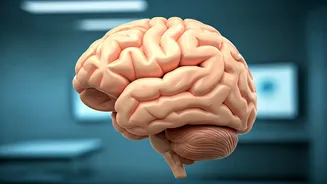Brain-Boosting Exercise
According to a neurologist, a specific, simple exercise holds the key to enhancing brain health. This exercise is not about complex routines or expensive
equipment; it's a practice that can be easily integrated into daily life. It is recommended, though specific details about the exercise itself are not mentioned, suggesting the importance of incorporating this activity regularly. The impact of this practice is noteworthy as it can literally increase brain size. This directly relates to the brain’s plasticity, its ability to change and adapt throughout life. By engaging in this exercise, individuals may enhance cognitive functions, such as memory, focus, and overall mental performance. The benefits further extend to reducing the risk of age-related cognitive decline, promoting mental resilience, and fostering a healthier brain overall. The consistency of incorporating this exercise is crucial for experiencing the full potential of its advantages.
Understanding Brain Plasticity
The brain’s plasticity is central to the concept of the brain-boosting exercise. It is a concept that emphasizes the brain's ability to reorganize itself by forming new neural connections throughout life. This is a crucial function, as it allows the brain to adapt to new experiences, learn new information, and compensate for injuries or diseases. The brain is not a static organ, but a dynamic one, constantly changing and evolving. It explains how individuals can improve cognitive abilities and overall brain health at any age. Regular engagement in the recommended exercise stimulates these changes, enhancing neural pathways and strengthening the brain’s structural integrity. This continuous adaptation is essential for maintaining cognitive vitality and resilience. The brain’s plasticity supports the brain’s capacity to recover from damage and maintain optimal function, highlighting the exercise's overall importance.
Incorporating Into Daily Life
To fully utilize the benefits of the brain-boosting exercise, it must be consistently included in your everyday life. This means making a conscious effort to practice it regularly, whether it's every day or several times a week. The ease of the exercise is designed to make it simple to integrate into any schedule. Consistency is vital because the brain adapts and strengthens itself over time through repeated engagement. Set realistic goals and begin slowly, gradually increasing the duration or intensity as tolerated. The exercise can be combined with other healthy habits, such as a balanced diet, adequate sleep, and mental stimulation, to get the best results. Moreover, tracking progress and adjusting the routine as needed is essential to maximize the exercise's effectiveness. By integrating it into daily life and remaining persistent, individuals can make meaningful changes to their brain health and overall well-being. Ultimately, committing to this practice promotes a proactive approach to cognitive health.
Beyond Exercise: Additional Tips
While the exercise is a significant component, other lifestyle choices play an important role in enhancing brain health and longevity. It is necessary to have a balanced diet rich in nutrients, including omega-3 fatty acids, antioxidants, and vitamins. Regular physical activity, beyond the recommended exercise, also benefits the brain by increasing blood flow and oxygen supply, which promotes neural health. Sufficient sleep is vital because it allows the brain to repair and consolidate memories. Furthermore, staying mentally active through activities such as reading, puzzles, and learning new skills keeps the brain engaged and improves cognitive function. Reducing stress through mindfulness practices, meditation, or spending time in nature is also beneficial. By combining the recommended exercise with these additional healthy habits, individuals can create a holistic approach to brain health and promote a longer, healthier life.
Long-Term Benefits and Beyond
The long-term benefits of regular exercise extend beyond improved cognitive function. This exercise contributes to overall health and well-being. It can reduce the risk of age-related cognitive decline, such as memory loss and dementia. Moreover, it can enhance mood, reduce stress, and improve mental clarity. The practice supports healthy aging and promotes a better quality of life. The benefits are cumulative, improving over time with consistent practice. This is about making an investment in your future. Embrace the process and celebrate the small wins along the way. Ultimately, integrating this practice empowers you to take control of your cognitive health and live a longer, healthier, and more fulfilling life.












